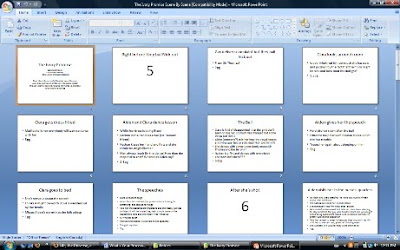Today’s post is in the spirit of silliness and making people feel better about their writing. These are all problems that you may or may not find in my first draft.
Your Main Character’s love interest morphs from the nice, helpful guy you planned into a weird, over-controlling pervert with an eye twitch.
That’s OK! You can change it later.
Your Main Character has absolutely no reaction to major, life changing events because you’re too busy writing the rest of the scene and keeping all the details straight.
That’s okay. You can change it later.
One of the Bad Guys is obviously NOT a Bad Guy, but your Main Character doesn’t realize this simply because YOU TOLD HER NOT TO.
That’s okay. You can change it later.
Your main characters makes no decisions and just lets stuff happen to them like they’re on a roller coaster.
That’s okay. You can change it later.
Your Main Character has one of three reactions: smiling, sighing or feeling sick to her stomach.
That’s okay. You can change it later.
Your book is getting too long so you cut it short, but the ending isn’t really there anymore.
That’s okay. You can change it later.
You describe minute details of the characters life like the smell of soap in the bathroom, and how they brush their hair, and put their clothes on, and end the scenes/chapters with them going to bed for the night.
That’s okay. You can change it later.
Your scenes have no Objective, Obstacle, or Outcome because you didn’t know they were supposed to.
That’s okay. You can change it later.
Your Main Character has no motive and sometimes just decides to do stuff because that’s what the plot calls for. (Wait, when did someone give them the script?)
That’s okay. You can change it later.
Your Main Character comes to conclusions right on the spot that should take a long time of reflection and are based on the concepts from your first year Psych course, (which your MC never took).
That’s okay. You can change it later.
Your Main Character conveniently finds passages, letters, maps, as well as overhears conversations so that the plot can work.
That’s okay. You can change it later.
And finally, as well as possibly worse of all, the MC and friend’s plans towards the end of the novel are far-fetched and ridden with holes, but they get away anyway due to lucky circumstances. (Hero has to win, right?)
Say it with me, everybody! That’s OK! You can change it later.
That’s all I can think of. (Like that’s not enough, right?)
How about you? What problems may or may occur in your first drafts?


